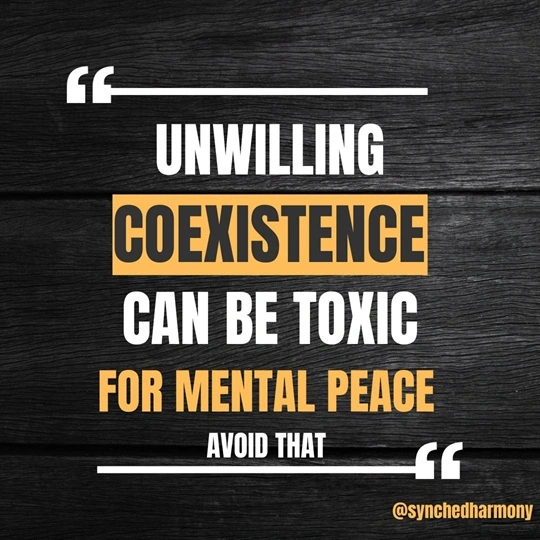The main theme of this website revolves around peaceful coexistence, where we focus on discussing ways for peaceful livelihood under one roof in a household by working together in sync to achieve a harmonious relationship. However, you might sometimes wonder how easy it is to say things and give pieces of advice for free to others but achieving it in reality is much more challenging and difficult. Unwilling peaceful coexistence is very troublesome, and in such cases, it is essential to question the applicability of principles of synched harmony and understand how beneficial it can be in achieving a harmonious relationship.

In today’s article, we will discuss unwillingly peaceful coexistence, which may also be referred to as forced coexistence. We will explore the possibilities to achieve synched harmony by applying its principles in cases where people are unwillingly staying together with each other. We will delve into this topic in detail and share experiences from my personal life, I want to convey my learnings from it, which can also apply to similar endeavors in your life.
Before starting, I would like to know from the audience what they understand about peaceful coexistence? I would like you to comment below from your perspective, what, in your opinion, should peaceful coexistence entail? Whether it’s a relationship, marriage, or a family household, how would you define the concept of peaceful coexistence?
What is Peaceful Coexistence in Marriage?
As per my thought, the concept of peaceful cohabitation in relationships implies living under the same roof peacefully with each other, from a relationship’s perspective, it’s a state of existing together in the same place and at the same time harmoniously and peacefully. It inherently involves:
- Respecting personal boundaries of each other.
- Giving required space to others.
- Understanding and identifying each other’s nature and behavioral patterns.
- Comprehending each other’s mindset.
- Viewing things from others’ perspectives and understanding their emotions.
- Celebrating joy together and supporting each other during difficult times by standing by each other during tough and challenging situations.
- Allowing everyone to live a peaceful and tranquil life as per their preferences.
- Making a sincere effort to fulfill others’ desires by sacrificing one’s own preferences to meet the needs of others.
- Avoiding possessiveness and adapting oneself to existing situations and circumstances.
- Maintaining a home environment that fosters peace without imposing many restrictions, ensures it doesn’t become a source of frustration.
Reading through all this might seem like a lot, and you might think it’s almost like setting expectations for each other, where meeting all the above criteria is nearly impossible. Although it may seem quite cumbersome at first glance, if we try to understand this in simpler terms, it’s not that difficult at all; it just requires the effective use of collaboration, compromise, and other principles of synched harmony to be used appropriately. One thing to note here is that you can’t just apply these principles in your life just like that for the sake of it; it needs to be embraced genuinely.
What is Unwilling Peaceful Coexistence in a Relationship?
Remember that going against one’s own desires and doing things forcefully may never bring true happiness as sometimes it requires both your heart and mind to be in sync with each other before you make an absolutely critical decision. If that’s not the case, you may find yourself in great belief of doubt every time.
Consider this with a situation where you are forced to do something under pressure that’s absolutely against your wish – how long would you be able to keep that up? In my opinion, definitely not for too long. What if it’s something that you are forced to do for your entire life? Won’t it be quite challenging and frustrating at the same time for you to continue? Will it not lead to a mental breakdown or emotional unbalance?
Doing things unwillingly can have a profound impact on your mental and emotional well-being. Even though some things may seem legit on the surface, they can still have a long-lasting impact on your inner peace and mental health. My point is pretty straightforward – being in a relationship unwillingly has a deep impact on your mental and physical health, even if it seems to be for the greater good.
Suppose that, by force or influence, you tried to keep two individuals together in your household who absolutely do not like each other. This could create a situation of discomfort that may have a profound impact on their mental well-being if they are forced to live in such a strained environment for an extended period. In such a case, no matter how much effort you put into improving things, the situation may not improve; instead, it might lead to more discomfort.
Despite your attempts to keep them close, these individuals might further distance themselves thus making the relationship bonds even weaker, putting more sourness in their relationship. Consider this situation with two opposite poles of a magnet – even if you bind them together, once the rope breaks, they will move apart.
Synched harmony cannot be forced; people working together harmoniously is the essential part of it, but this can only happen when they genuinely want to be with each other, feel an attachment to each other, and genuinely care for each other. Achieving synched harmony becomes quite challenging if these elements are not naturally present in both parties. You can’t force someone to love another person, emotions cannot be altered forcibly. Certain things have to be developed genuinely from the inside and if it can’t happen, it’s important to accept it and move on.
Thinking about others’ losses for personal gains is considered to be quite selfish behavior. Just because you crave something doesn’t mean others also desire the same, and it doesn’t necessarily imply that your perspective on a particular situation is correct while all others involved bonded to that situation are wrong. It’s completely acceptable for people to have varied thoughts and perspectives, and their behavior towards each other can vary. It’s not necessary for them to like and be comfortable with the same person you like.
How to Cope with Unwilling Peaceful Coexistence in Household
The question here is, what’s the best alternative in such a situation? Should we just pray and hope that things will get sorted someday and they will get used to each other behaviors and personalities which may result in harmonious living in the future, or should we just accept the fact that their peaceful coexistence is impossible and separate them from each other so that they can each live their own life peacefully?
Situations can indeed vary widely, and here thinking multidimensionally is crucial. The initial three principles of synched harmony—perspective, mindset, and multidimensional thinking—play a significant role in guiding you toward morally correct decisions. They provide an approach for considering various factors and aspects of a situation, enabling you to make more informed and balanced choices.
In such circumstances, it’s crucial to make an effort and try to resolve the conflict, but it’s even crucial to know when to stop trying. If you’re going with the assumption that your efforts should continue and one fine day your hard work will pay off, then it may be a misguided belief. While it’s true that continuous effort in the right direction is essential, and chances of things improving gradually exist, but to continue to persist things when every attempt of effort is met with failure can prove to be futile. Finding a balance between trying to convince and not trying at all is necessary because neither extreme is the ideal path.
Efforts should yield positive recognition and bring about a positive change. However, if your efforts are consistently attracting negative outcomes, it’s wise to consider stopping trying. Trying to save yourself from the inner guilt of not having an ideal family with strong relationship bonds because you never made an effort in the first place is fine but turning that effort into stubbornness can be detrimental. If, after countless efforts, people remain unwilling to live together peacefully, then accepting this fate and moving forward is the ideal solution.
Whether it’s morally correct or incorrect, sometimes you can’t just do anything about it, and you need to find alternative solutions to ensure the happiness of both parties separately. We must remember that unwilling peaceful coexistence can be toxic to mental health, so efforts should be made to avoid it at any cost.
Even if you’re not staying close, living separately nearby can be a good option to consider. This way, both can maintain their inner peace and well-being. You won’t need to distance yourself too much, and both parties can be content. My suggestion would be to let go of your stubbornness and give both individuals a chance to find their balance, who knows there might be a possibility that over time, their mutual differences could diminish, and they may become willing to live peacefully with each other again. Giving them space at the moment is necessary during these times.
Conclusion
To conclude, unwilling peaceful coexistence can be toxic; it should be avoided to preserve your inner peace and mental well-being. You cannot forcibly make others stay together against their will. It’s essential to understand that sometimes two people may not get along, and it doesn’t mean one of them is mean. Everyone has their place; understanding their perspective is crucial.
We should make efforts to resolve misunderstandings between them and address their concerns, but if, despite your countless efforts, the situation between them doesn’t improve, it’s better to give both individuals some time apart as sooner or later it can result in unwilling peaceful coexistence. Providing enough space allows them to overcome inner turmoil, release frustration, and, in turn, regain mental balance. With appropriate space, they can reflect on what went wrong and make an effort to improve circumstances.
FOLLOW Synched Harmony Join our vibrant community for daily inspiration. Swipe-Up to follow for more related content.
